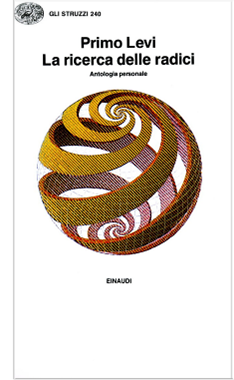La ricerca delle radici

La ricerca delle radici is an anthology of the authors who were the most meaningful to Primo Levi, in his education and upbringing. He weaves together his scientific and his humanistic interests.
At the suggestion of Giulio Bollati in 1981, Levi compiled an anthology of the authors who were the most meaningful to him in his education and upbringing. At the same time, he explained the reasons for his choices in a series of short introductions, which, in themselves, can be considered a declaration of poetry. La ricerca delle radici confirms Levi’s omnivorous, encyclopedic and curious nature. He weaves together his scientific and his humanistic interests. Darwin, Bragg, Gutterman, and Thorne intertwine with Homer, Conrad, Saint-Exupéry and Babel, thus offering us an authentic intellectual self-portrait. In this, “Primo Levi gives us much more than he seems to offer us,” as Geno Pampaloni wrote.
Back jacket, Einaudi 1997.
"How many of our roots come from the books we have read? All, many, a little, or none, depending on the environment in which we are born, our temperament, and the labyrinth that fate has assigned to us. There are no rules: Christopher Columbus’s logbooks make for pithy reading but they contain no trace of a literary input; they are redolent of the man of adventure, the merchant and the politician, no more. At the other extreme, Anatole France remains a master of life and an amiable companion of the road, and yet his many books seem to derive from other books which are themselves bookish.
Always inclined to a hybrid input, I accepted willingly and with curiosity the proposal to compile a 'personal anthology,' not in the Borgesian sense of an auto-anthology but in that of a harvesting, retrospectively and in good faith, which would bring to light the possible traces of what has been read on what has been written. I accepted it as a bloodless experiment and to observe the effects.
[…]
As regards the individual texts and authors, or the passages within the work of each author, the choice was sincere, and almost automatic. I have a habit of placing my favorite books on the same shelf, independently of their theme and their age, and all are profusely underlined in the places that I love to reread: so I have not had to work very hard. Now, in the ultimate compilation, I notice a pattern that was not in the program, the more so because I didn’t have a program. More or less all the choices contain or imply a tension. More or less all show the effects of the fundamental dichotomies customary in the destiny of every conscious person: falsehood/truth, laughter/tears, judgment/folly, hope/despair, triumph/disaster".
Levi, “Introduction,” Roots 2001; pp. 3, 7-8.
